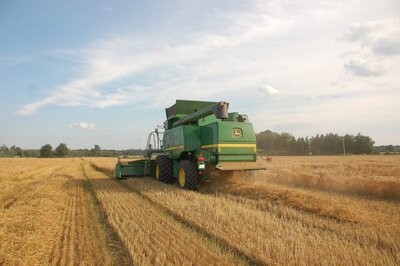Organic farming: opportunities & challenges of digital technologies
Organic farming: opportunities & challenges of digital technologies
We are on the edge of a digital transformation with the promise of connecting millions of people via digital technologies. Such technologies aim to improve the efficiency of food production, address environmental challenges, and enhance consumer trust in the agri-food systems.
Digitalisation is, therefore, a hot topic on the EU agenda. Expectations are high but so are the uncertainties about the way they will be deployed. It provides both opportunities and challenges to the agri-food sector, including the fast-growing organic sector. Digital technology has indeed a big potential for organic farming and, by being implemented throughout the organic value chain, can also have a huge potential to contribute to the current and future societal challenges.
One of the most recent examples is the FarmSuite initiative, a laureate project from SmartAgriHubs’ Open Call as a RESPOND to the COVID-19 situation in Europe. FarmSuite is a platform that can facilitate organic farmers’ access to the digital market in Italy. It was a direct response to the Covid-19 crisis and its impact on organic food markets and on-farm businesses that rely on direct-to-consumer channels to sell their products. This initiative from AIAB Srl is an integrated, easy-to-use, modular platform tailored to small and medium organic farms and processors with the goal to allow farmers to save time and reduce waste. On one side, it is a modular management tool for farmers but on the other side, it gives each farm access to a virtual farmers market stand which can be used to tell the farms’ story and sell products directly to consumers on local, regional, or national level.
It provides the tools needed to effectively plan, manage, and optimize production and sales. This initiative demonstrates the benefits digital technologies can offer to the organic sector, in this case, access to the digital market. Potential benefits can also concern efficiency, empowering farmers to have an in-depth knowledge of the specific conditions of their farms like the soil and animal health.
Yet digitalisation should not be an excuse to industrialize agri-food systems. Digitalising the agri-food system requires a thorough evaluation of the impact of the technologies- from the socio-economic perspective to its sustainability and its contribution to the transformation of our food systems. Digitalisation should be seen as a set of tools to support a holistic transformation where the soil is preserved, organic matter increased, diversification brings together livestock and crops, diversity is increased, nutrient cycles are closed, and inputs are minimized, in the entire food supply chain.
 Furthermore, the uptake of digital technologies should leave no one behind and policy-makers should ensure adequate support for all the actors of the supply chain to become more sustainable. One of the possible key instruments is the green architecture of the Common Agricultural Policy. IFOAM Organics Europe is advocating for at least 30% of the pillar budget to be allocated to Eco-schemes, to support a wide range of climate, animal welfare, and environmental interventions. Digital solutions, for instance, precision farming, could receive support, provided it has a clear positive effect on the environment, such as minimised nutrient release or reduced water use.
Furthermore, the uptake of digital technologies should leave no one behind and policy-makers should ensure adequate support for all the actors of the supply chain to become more sustainable. One of the possible key instruments is the green architecture of the Common Agricultural Policy. IFOAM Organics Europe is advocating for at least 30% of the pillar budget to be allocated to Eco-schemes, to support a wide range of climate, animal welfare, and environmental interventions. Digital solutions, for instance, precision farming, could receive support, provided it has a clear positive effect on the environment, such as minimised nutrient release or reduced water use.
A transition towards a fair, environmentally conscious, healthy, and caring system widely adopted in Europe is achievable, but we need to make sure that all the actors of the agri-food supply chain are supported.



